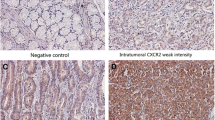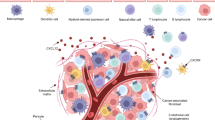Abstract
Background
The CXCL12-CXCR4 chemokine axis plays an important role in cell trafficking as well as in tumor progression. In colorectal cancer (CRC), the chemokine receptor CXCR4 has been shown to be an unfavorable prognostic factor in some studies, however, the role of its activated (phosphorylated) form, pCXCR4, has not yet been evaluated. Here, we aimed to investigate the prognostic value of CXCR4 and pCXCR4 in a large cohort of CRC patients.
Patients and methods
A tissue microarray (TMA) of 684 patient specimens of primary CRCs was analyzed by immunohistochemistry (IHC) for the expression of CXCR4 and pCXCR4 by tumor cells and tumor-infiltrating immune cells (TICs).
Results
The combined high expression of CXCR4 and pCXCR4 showed a favorable 5-year overall survival rate (68%; 95%CI = 59–76%) compared to tumors showing a high expression of CXCR4 only (48%; 95%CI = 41–54%). High expression of pCXCR4 was significantly associated with a favorable prognosis in a test and validation group (p = 0.015 and p = 0.0001). Moreover, we found that CRCs with a high density of pCXCR4+ tumor-infiltrating immune cells (TICs) also showed a favorable prognosis in a test and validation group (p = 0.054 and p = 0.004). Univariate Cox regression analysis for TICs revealed that a high density of pCXCR4+ TICs was a favorable prognostic marker for overall survival (HR = 0.97,95%CI = 0.96–1.00; p = 0.01). In multivariate Cox regression survival analyses a high expression of pCXCR4 in tumor cells lost its association with a better overall survival (HR = 0.99; 95%CI = 0.99–1.00, p = 0.098).
Conclusion
Our results show that high densities of CXCR4 and pCXCR4 positive TICs are favorable prognostic factors in CRC.


Similar content being viewed by others
References
J. Ferlay, I. Soerjomataram, R. Dikshit, S. Eser, C. Mathers, M. Rebelo, D.M. Parkin, D. Forman, F. Bray, Cancer incidence and mortality worldwide: sources, methods and major patterns in GLOBOCAN 2012. Int J Cancer 136, E359–E386 (2015)
H. Brenner, M. Kloor, C.P. Pox, Colorectal cancer. Lancet 383, 1490–1502 (2014)
I. Zlobec, A. Lugli, Prognostic and predictive factors in colorectal cancer. Postgrad Med J 84, 403–411 (2008)
F. Pagès, J. Galon, M.-C. Dieu-Nosjean, E. Tartour, C. Sautès-Fridman, W.-H. Fridman, Immune infiltration in human tumors: a prognostic factor that should not be ignored. Oncogene 29, 1093–1102 (2010)
T. Tanaka, M. Tanaka, T. Tanaka, R. Ishigamori, Biomarkers for colorectal cancer. Int J Mol Sci 11, 3209–3225 (2010)
G. Lech, R. Słotwiński, M. Słodkowski, I.W. Krasnodębski, Colorectal cancer tumour markers and biomarkers: Recent therapeutic advances. World J Gastroenterol 22, 1745–1755 (2016)
L.M. Coussens, Z. Werb, Inflammation and cancer. Nature 420, 860–867 (2002)
A. Lasry, A. Zinger, Y. Ben-Neriah, Inflammatory networks underlying colorectal cancer. Nat Immunol 17, 230–240 (2016)
J.A. Burger, CXCR4: a key receptor in the crosstalk between tumor cells and their microenvironment. Blood 107, 1761–1767 (2006)
R. Siegel, J. Ma, Z. Zou, A. Jemal, Cancer statistics, 2014. CA Cancer J Clin 64, 9–29 (2014)
F. Guo, Y. Wang, J. Liu, S.C. Mok, F. Xue, W. Zhang, CXCL12/CXCR4: a symbiotic bridge linking cancer cells and their stromal neighbors in oncogenic communication networks. Oncogene 35, 816–826 (2015)
X. Sun, G. Cheng, M. Hao, J. Zheng, X. Zhou, J. Zhang, R.S. Taichman, K.J. Pienta, J. Wang, CXCL12 / CXCR4 / CXCR7 chemokine axis and cancer progression. Cancer Metastasis Rev 29, 709–722 (2010)
L. Lombardi, F. Tavano, F. Morelli, T.P. Latiano, P. Di Sebastiano, E. Maiello, Chemokine receptor CXCR4: role in gastrointestinal cancer. Crit Rev Oncol Hematol 88, 696–705 (2013)
C.C. Schimanski, P.R. Galle, M. Moehler, Chemokine receptor CXCR4-prognostic factor for gastrointestinal tumors. World J Gastroenterol 14, 4721–4724 (2008)
B.E. Lippitz, Cytokine patterns in patients with cancer: A systematic review. Lancet Oncol 14, e218–e228 (2013)
B.A. Teicher, S.P. Fricker, CXCL12 (SDF-1)/CXCR4 pathway in cancer. Clin Cancer Res 16, 2927–2931 (2010)
M. Thelen, Dancing to the tune of chemokines. Nat Immunol 2, 129–134 (2001)
S.-C. Wang, J.-K. Lin, H.-S. Wang, S.-H. Yang, A.F.-Y. Li, S.-C. Chang, Nuclear expression of CXCR4 is associated with advanced colorectal cancer. Int J Color Dis 25, 1185–1191 (2010)
C.C. Schimanski, S. Schwald, N. Simiantonaki, C. Jayasinghe, U. Gönner, V. Wilsberg, T. Junginger, M.R. Berger, P.R. Galle, M. Moehler, Effect of chemokine receptors CXCR4 and CCR7 on the metastatic behavior of human colorectal cancer. Clin Cancer Res 11, 1743–1750 (2005)
J. Kim, T. Mori, S.L. Chen, F.F. Amersi, S.R. Martinez, C. Kuo, R.R. Turner, X. Ye, A.J. Bilchik, D.L. Morton, D.S.B. Hoon, Chemokine receptor CXCR4 expression in patients with melanoma and colorectal cancer liver metastases and the association with disease outcome. Ann Surg 244, 113–120 (2006)
N. Yoshitake, H. Fukui, H. Yamagishi, A. Sekikawa, S. Fujii, S. Tomita, K. Ichikawa, J. Imura, H. Hiraishi, T. Fujimori, Expression of SDF-1 alpha and nuclear CXCR4 predicts lymph node metastasis in colorectal cancer. Br J Cancer 98, 1682–1689 (2008)
L.-N. Li, K.-T. Jiang, P. Tan, A.-H. Wang, Q.-Y. Kong, C.-Y. Wang, H.-R. Lu, J. Wang, Prognosis and Clinicopathology of CXCR4 in Colorectal Cancer Patients: a Meta-analysis. Asian Pac J Cancer Prev 16, 4077–4080 (2015)
S. Lv, Y. Yang, S. Kwon, M. Han, F. Zhao, H. Kang, C. Dai, R. Wang, The association of CXCR4 expression with prognosis and clinicopathological indicators in colorectal carcinoma patients: a meta-analysis. Histopathology 64, 701–712 (2014)
F. Xu, F. Wang, M. Di, Q. Huang, M. Wang, H. Hu, Y. Jin, J. Dong, M. Lai, Classification based on the combination of molecular and pathologic predictors is superior to molecular classification on prognosis in colorectal carcinoma. Clin Cancer Res 13, 5082–5088 (2007)
S. Saigusa, Y. Toiyama, K. Tanaka, T. Yokoe, Y. Okugawa, A. Kawamoto, H. Yasuda, Y. Inoue, C. Miki, M. Kusunoki, Stromal CXCR4 and CXCL12 expression is associated with distant recurrence and poor prognosis in rectal cancer after chemoradiotherapy. Ann Surg Oncol 17, 2051–2058 (2010)
S. Hassan, C. Ferrario, U. Saragovi, L. Quenneville, L. Gaboury, A. Baccarelli, O. Salvucci, M. Basik, The influence of tumor-host interactions in the stromal cell-derived factor-1/CXCR4 ligand/receptor axis in determining metastatic risk in breast cancer. Am J Pathol 175, 66–73 (2009)
L. Brault, A. Rovó, S. Decker, C. Dierks, A. Tzankov, J. Schwaller, CXCR4-SERINE339 regulates cellular adhesion, retention and mobilization, and is a marker for poor prognosis in acute myeloid leukemia. Leukemia 28, 566–576 (2014)
H. Hampel, J.A. Stephens, E. Pukkala, R. Sankila, L.A. Aaltonen, J.-P. Mecklin, A. de la Chapelle, Cancer risk in hereditary nonpolyposis colorectal cancer syndrome: later age of onset. Gastroenterology 129, 415–421 (2005)
J. Kim, H. Takeuchi, S.T. Lam, R.R. Turner, H.-J. Wang, C. Kuo, L. Foshag, A.J. Bilchik, D.S.B. Hoon, Chemokine receptor CXCR4 expression in colorectal cancer patients increases the risk for recurrence and for poor survival. J Clin Oncol 23, 2744–2753 (2005)
L. Stanisavljević, J. Aßmus, K.E. Storli, S.M. Leh, O. Dahl, M.P. Myklebust, CXCR4, CXCL12 and the relative CXCL12-CXCR4 expression as prognostic factors in colon cancer. Tumor Biol 37, 7441–7452 (2015)
F.M. Speetjens, G.J. Liefers, C.J. Korbee, W.E. Mesker, C.J.H. Van De Velde, R.L. Van Vlierberghe, H. Morreau, R.A. Tollenaar, P.J.K. Kuppen, Nuclear localization of CXCR4 determines prognosis for colorectal cancer patients. Cancer Microenviron 2, 1–7 (2009)
W. Sterlacci, S. Saker, B. Huber, M. Fiegl, A. Tzankov, Expression of the CXCR4 ligand SDF-1/CXCL12 is prognostically important for adenocarcinoma and large cell carcinoma of the lung. Virchows Arch 468, 463–471 (2016)
T. Pozzobon, G. Goldoni, A. Viola, B. Molon, CXCR4 signaling in health and disease. Immunol Lett 177, 6–15 (2016)
R.J. Phillips, M.D. Burdick, M. Lutz, J.A. Belperio, M.P. Keane, R.M. Strieter, The stromal derived factor-1/CXCL12-CXC chemokine receptor 4 biological axis in non-small cell lung cancer metastases. Am J Respir Crit Care Med 167, 1676–1686 (2003)
O. Wald, U. Izhar, G. Amir, S. Avniel, Y. Bar-Shavit, H. Wald, I.D. Weiss, E. Galun, A. Peled, CD4+CXCR4highCD69+ T cells accumulate in lung adenocarcinoma. J Immunol 177, 6983–6990 (2006)
M.K. Wendt, P.A. Johanesen, N. Kang-Decker, D.G. Binion, V. Shah, M.B. Dwinell, Silencing of epithelial CXCL12 expression by DNA hypermethylation promotes colonic carcinoma metastasis. Oncogene 25, 4986–4997 (2006)
I. Roy, N.P. Zimmerman, A.C. Mackinnon, S. Tsai, D.B. Evans, M.B. Dwinell, CXCL12 chemokine expression suppresses human pancreatic cancer growth and metastasis. PLoS One 9, e90400 (2014)
J. Galon, A. Costes, F. Sanchez-Cabo, A. Kirilovsky, B. Mlecnik, C. Lagorce-Pagès, M. Tosolini, M. Camus, A. Berger, P. Wind, F. Zinzindohoué, P. Bruneval, P.-H. Cugnenc, et al., Type, density, and location of immune cells within human colorectal tumors predict clinical outcome. Science 313, 1960–1964 (2006)
K. Lim, Y.-M. Hyun, K. Lambert-Emo, T. Capece, S. Bae, R. Miller, D.J. Topham, M. Kim, Neutrophil trails guide influenza-specific CD8+ T cells in the airways. Science 349, aaa4352 (2015)
V. Governa, E. Trella, V. Mele, L. Tornillo, F. Amicarella, E. Cremonesi, M.G. Muraro, H. Xu, R. Droeser, S.R. Däster, M. Bolli, R. Rosso, D. Oertli, S. Eppenberger-Castori, L.M. Terracciano, G. Iezzi G, G.C. Spagnoli, The interplay between neutrophils and CD8(+) T cells improves survival in human colorectal cancer. Clin Cancer Res 23, 3847–3858 (2017)
S. Konoplev, J.L. Jorgensen, D.A. Thomas, E. Lin, J. Burger, H.M. Kantarjian, M. Andreeff, L.J. Medeiros, M. Konopleva, Phosphorylated CXCR4 is associated with poor survival in adults with B-acute lymphoblastic leukemia. Cancer 117, 4689–4695 (2011)
J.-P. Spano, F. Andre, L. Morat, L. Sabatier, B. Besse, C. Combadiere, P. Deterre, A. Martin, J. Azorin, D. Valeyre, D. Khayat, T. Le Chevalier, J.-C. Soria, Chemokine receptor CXCR4 and early-stage non-small cell lung cancer: pattern of expression and correlation with outcome. Ann Oncol 15, 613–617 (2004)
A. Dubrovska, M. Cojoc, F. Peitzsch, F. Trautmann, G.D. Polishchuk, A. Telegeev, Emerging targets in cancer management: role of the CXCL12/CXCR4 axis. Onco Targets Ther 6, 1347–1361 (2013)
Acknowledgements
GI was supported by SNF (CH) grant no. PP00P3-133699 and GCS was supported by SNF (CH) grant no. 310030_149745.
Author information
Authors and Affiliations
Corresponding author
Ethics declarations
Ethical statement
All authors have agreed to the submission of this manuscript and have participated in the study to a sufficient extent to be named as authors.
Conflict of interest
The authors have no conflicts of interest to disclose for the present study.
Rights and permissions
About this article
Cite this article
Weixler, B., Renetseder, F., Facile, I. et al. Phosphorylated CXCR4 expression has a positive prognostic impact in colorectal cancer. Cell Oncol. 40, 609–619 (2017). https://doi.org/10.1007/s13402-017-0348-2
Accepted:
Published:
Issue Date:
DOI: https://doi.org/10.1007/s13402-017-0348-2




